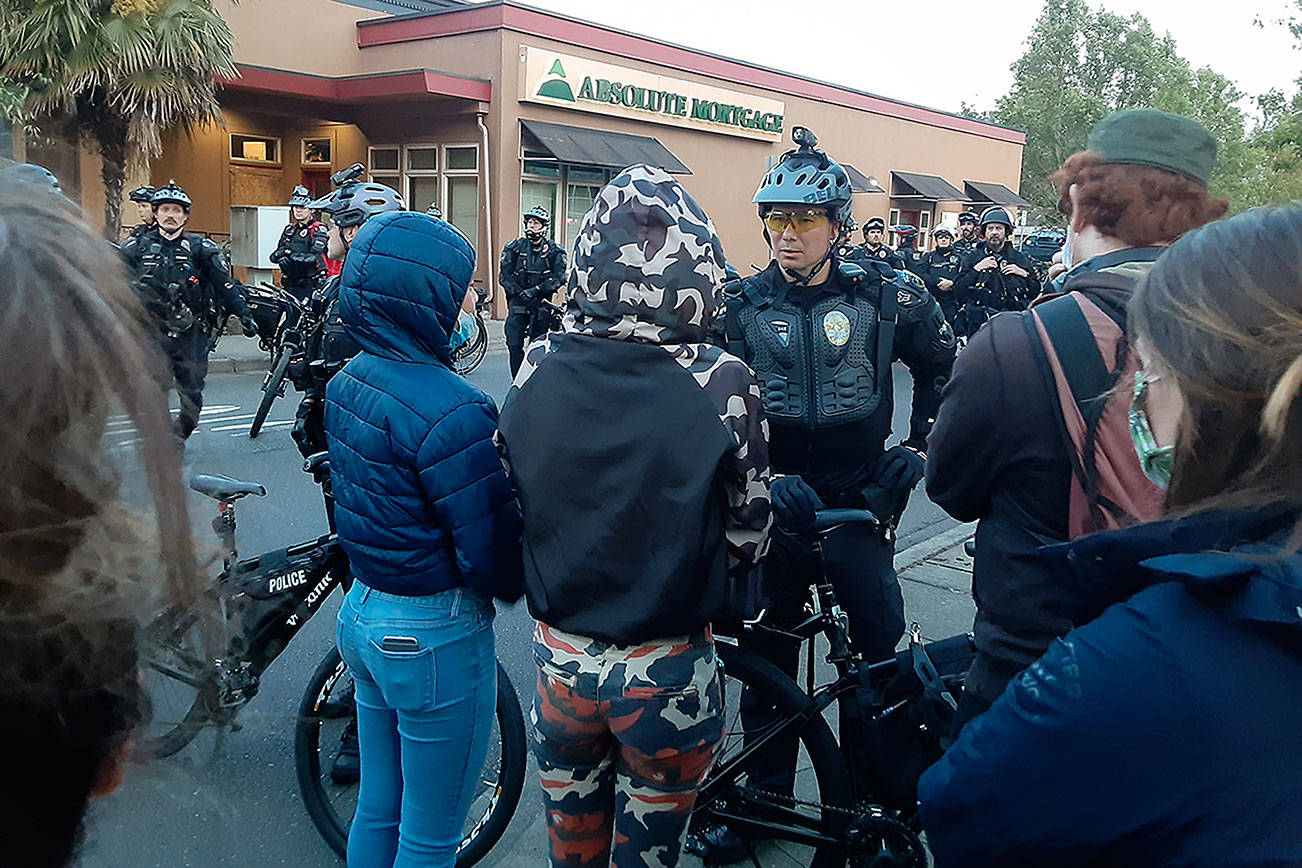On Tuesday evening, hundreds of people gathered on the Auburn City Hall Plaza to protest loudly — here and there obscenely, but in the end peacefully — the death of George Floyd under the knee of a Minneapolis police officer.
Protesters then marched east down Main Street to the Auburn Justice Center and back again.
On signs and shirts, with chants and in speeches and song by members of the Muckleshoot Tribe, they laid at feet of the system and police a litany of wrongs committed against people of color.
“It’s not just about George Floyd,” Auburn Mayor Nancy Backus said at the June 2 event. “This is about dignity, respect, equality and removing injustices. I am here with you, believing the same things you do. I am not perfect … but I want to learn so that I can be better and do better.”
In front of her, signs waved messages from the last words of Floyd — “I can’t breathe” — as well as “Black Lives Matter.” They carried the names of lesser known, but still fiercely loved and missed human beings.
Rachel Heaton of Pacific, a member of the Muckleshoot Tribe, said the very bricks of the plaza were laid over land that once belonged to the Muckleshoot Tribe, but was stolen by white pioneers.
“This isn’t about good cop, bad cop. This is about a system that oppresses black and brown people,” Heaton said. “We stand up here because today, we elevate your voices. Today, we elevate black people’s struggles. Today we elevate the injustices that are going on in white communities because as native people, we understand your struggles.
“We are much stronger together than when we are separated,” Heaton said. “We ask for justice for George Floyd. We ask for justice for Ahmaud Arbery. We ask for justice for Renee Davis. We ask for justice for all the black and brown people that are destroyed by police brutality.”
Auburn Police Chief Dan O’Neil, flanked by a handful of officers and Backus, listened to accusations against officers accused of abusing and murdering minorities.
Along Main Street, the crowd marched to the Auburn Justice Center, past businesses boarded up against potential mischief, and back to the plaza.
But the protest wasn’t done for everyone. In the west parking lot of the Auburn Justice Center, protesters taunted police, who stood in line in full riot gear, impassive as the taunts rose and fell.
Some of the protesters, clearly expecting something to happen, carried backpacks containing items to throw at police. A young woman challenged a reporter for taking “too many pictures” of a young man in a gas mask.
Mostly what the crowd wanted was for police to “take a knee,” to show solidarity with their cause.
A man chided an older police officer: “Hey you, yeah you, Old School, I know you been through this a lot, right?” he said. “You know right from wrong, right? What do you teach your grandkids if you have some, all due respect? No answer? It is what it is? Is it in your contract?”
At one moment somebody threw an object toward police, but that effort to escalate the standoff into something physical was met with a general shout of disapproval from the crowd, and there was no more of that.
Discussions could be heard in the crowd about hanging around past the 9 p.m. curfew to see what police would do. The mood softened when Auburn Police Officer C. Adams, an African-American, spoke to and embraced several people in the crowd.
But shortly after 9 p.m., when William Large, a seasoned protester from Seattle, called for the crowd at D and Main near Zolas to disperse, “to stay out of jail and free to protest another day,” it did, some people more willingly than others.
“That tear gas, it’s not a joke,” Large said as he walked away.
Talk to us
Please share your story tips by emailing editor@kentreporter.com.
To share your opinion for publication, submit a letter through our website https://www.kentreporter.com/submit-letter/. Include your name, address and daytime phone number. (We’ll only publish your name and hometown.) Please keep letters to 300 words or less.

